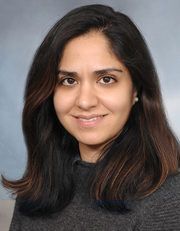Integrative Biosensing Laboratory (IBL)
In partnership with the College of Engineering and Applied Science, Cincinnati Children's Hospital, Center for Stem Cell, and Organoid Medicine (CuSTOM) at Cincinnati Children’s Hospital , the Integrative Biosensing Lab studies:
- Miniaturized electrokinetic devices for precise sensing and measurements
- Smart Scaffolds for tissue engineering and regenerative medicine
- Microfluidics for point-of-care diagnostics and drug screening
Novel Electrokinetic-based devices for liquid biopsy in cancer diagnostics
Circulating cancer biomarkers in blood

Research in action
Rapid and Label-free Resistive Pulse Sensing for Amplification-free Detection of Nucleic Acids
Smart Piezoelectric Scaffold for Tissue Regenerative


A microfluidic platform for high throughout Drug Screening

Faculty

Leyla Esfandiari
Assoc Professor, CEAS - Biomedical Eng
MANTEI
Dr. Esfandiari is a distinguished associate professor of Biomedical Engineering at the University of Cincinnati and a faculty member of Cincinnati Children’s Hospital Medical Center’s Stem Cell and Organoid Medicine (CuSTOM) program. She is highly regarded for her work in developing miniaturized technologies for biomedical applications. Her research is mainly focused on developing micro- and nano-scale devices, such as sensors and actuators, that can be applied in liquid biopsy and regenerative medicine. Her research has been supported by the National Institute of Health (NIH), the National Science Foundation (NSF), and the Department of Defense (DoD). Dr. Esfandiari has won many awards, including the NIH Maximizing Investigator Research Award (MIRA), the NSF CAREER Award, the Engineering and Applied Sciences Distinguished Research Award, and the Restemeyer Teaching Excellent Award.
Dr. Esfandiari received her B.S. in Electrical Engineering from the California State University of Long Beach (CSULB) and her M.Sc. in Biomedical Engineering from the University of California Irvine (UCI). She completed her doctoral degree in Bioengineering from the University of California Los Angeles (UCLA). While at UCLA, Esfandiari also conducted research at the California Nano-System Institution (CNSI), School of Medicine Neuroscience and Orthopedic Surgery Departments. During her academic training, Dr. Esfandiari has given back by leading and training graduate and undergraduate students. Besides her academic experiences, she has 3 years of industrial experience working at the tech companies in southern California.
Dr. Esfandiari received her B.S. in Electrical Engineering from the California State University of Long Beach (CSULB) and her M.Sc. in Biomedical Engineering from the University of California Irvine (UCI). She completed her doctoral degree in Bioengineering from the University of California Los Angeles (UCLA). While at UCLA, Esfandiari also conducted research at the California Nano-System Institution (CNSI), School of Medicine Neuroscience and Orthopedic Surgery Departments. During her academic training, Dr. Esfandiari has given back by leading and training graduate and undergraduate students. Besides her academic experiences, she has 3 years of industrial experience working at the tech companies in southern California.















